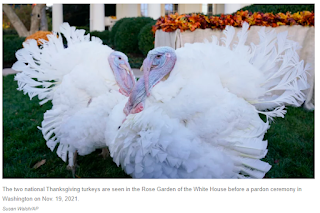News blues
Another week, another variant. This one, Omicron, seems to carry higher Covid reinfection risk. Scientists warn of higher rate of repeat infections but say vaccines appear to protect against serious illness.With the World Health Organization warning that the Omicron variant of the coronavirus poses a "very high" global risk - it appears to spread more easily and might resist vaccines and immunity in people who were infected with previous strains – the variant arrives in the US. New York and Hawaii are the latest to announce infections, and officials in both states said there is evidence of “community spread.” Cases have also been detected in California, Minnesota, Colorado, New York, and Hawaii. The Minnesota patient recently attended a New York City convention that drew thousands of people.
Read more >>
Meanwhile,
This means many more photos of amazing critters as I visit the beach near my California home. Not a bad scenario. A look at today’s denizens welcomes great egrets - Ardea alba. Adult great egrets range in size from 37 to 41 inches in length and have a wingspan of 51 inches. Moreover, the elegance!
Meanwhile,
…Omicron’s effect on the course of the pandemic will be determined by three factors: its transmissibility; the degree to which it evades our existing immune defenses; and its virulence, or the severity of the disease that it causes. If Omicron turns out to jump between hosts with ease, blow past our neutralizing antibodies, and cause unusually dangerous complications, we’ll all be in deep trouble. But it could also turn out to do a lot of other things, with more subtle implications. If Omicron ends up being super contagious, for example, but mild in its symptoms, that might even be a good thing.Read “Omicron’s Best- and Worst-Case Scenarios” >>
At this point, living with the coronavirus for years to come is all but inevitable. In many countries that have had vaccines in hand for the better part of a year, inoculation rates still aren’t close to 100 percent. Even if every human on Earth gained a degree of immunity from vaccination or infection, the virus could retreat into its many animal hosts, only to reenter the human population in a slightly different form. “There’s no reasonable person, I think, in public health now who thinks that eradication or elimination or having zero COVID is a realistic goal,” says Tara Kirk Sell, a senior scholar at the Johns Hopkins Center for Health Security.
Healthy planet, anyone?
Nurdles: the worst toxic waste you’ve probably never heard of: Billions of tiny plastic pellets – “nurdles,” a colloquial term for “pre-production plastic pellets” – a toxic waste that floats in the ocean, cause as much damage as oil spills. Nurdles, however, are still not classified as hazardous…the spillage of 87 containers full of lentil-sized plastic pellets - - nurdles – in May 2021, have been washing up in their billions along hundreds of miles of the Sri Lanka’s coastline, and are expected to make landfall across Indian Ocean coastlines from Indonesia and Malaysia to Somalia. In some places they are up to 2 metres deep. They have been found in the bodies of dead dolphins and the mouths of fish. About 1,680 tonnes of nurdles were released into the ocean. It is the largest plastic spill in history, according to the UN report.
Meanwhile, back at the ranch…
With the Biden administration's new, stricter Covid-19 testing requirements for all travelers taking effect this coming Monday, my return to South Africa in December looks less and less likely. Moreover, while I am a US citizen and could – legally and medically – return, at least in theory, reality suggests flights may not be available. I simply cannot afford to be locked down in South Africa or locked out from the US, for months again.This means many more photos of amazing critters as I visit the beach near my California home. Not a bad scenario. A look at today’s denizens welcomes great egrets - Ardea alba. Adult great egrets range in size from 37 to 41 inches in length and have a wingspan of 51 inches. Moreover, the elegance!
 |
| All photos (c) S. Galleymore |
Ground squirrels – never before mentioned here in a post - are ubiquitous along the beach and on the lawns. Members of the squirrel family of rodents - Sciuridae – they burrow into the ground rather than nest trees. Western gray squirrels – tree critters - live in the park's oak, cedar, and sycamore trees, too. Indeed, many visit my patio to plant nuts, seeds, and acorns in pots.
Viva creatures of the air and the earth!

















